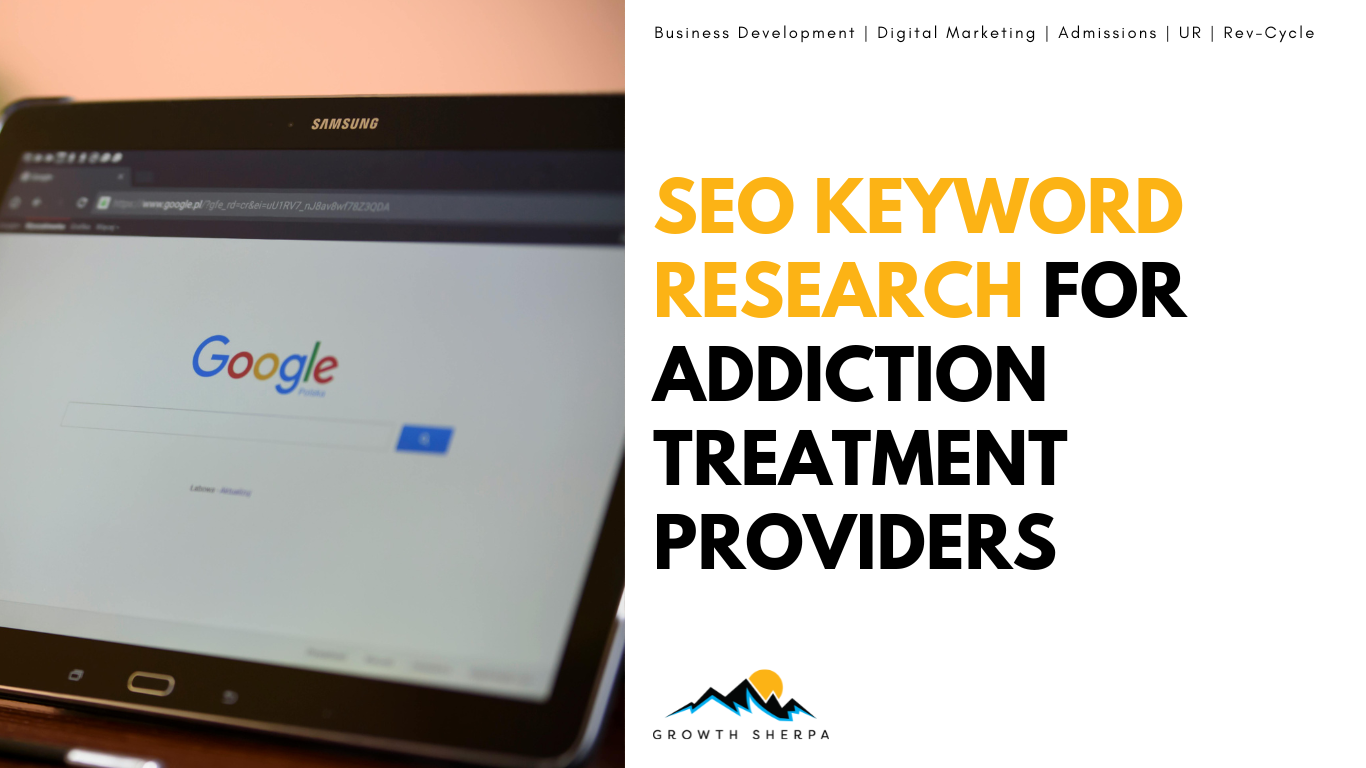In the competitive world of addiction treatment, the ability to reach individuals and families searching for help online is critical. As more people turn to search engines like Google to find treatment options, addiction treatment providers must ensure that their websites rank high in search engine results pages (SERPs). One of the most effective ways to do this is through strategic SEO keyword research. By targeting the right keywords, addiction treatment providers can drive more traffic to their websites, increase inquiries, and ultimately help more people. Below are the essentials of keyword research for addiction treatment, the tools you can use, the importance of local terms, and other strategies to optimize your digital presence and increase leads.
Why Keyword Research Matters for Addiction Treatment
Keyword research is the foundation of any successful SEO strategy. For addiction treatment providers, it involves identifying the words and phrases that potential clients and their loved ones use when searching for services online. By understanding these terms and incorporating them strategically into your website, you increase the likelihood of appearing in relevant search results.
This visibility translates to more website visits, which can lead to more inquiries, admissions, and opportunities to provide life-changing care. Without proper keyword research, even the most well-designed website may fail to attract the right audience.
Tools for Effective Keyword Research
To uncover the right keywords for your addiction treatment facility, you need reliable tools that provide insights into search volume, competition, and user intent. Below are some essential tools for effective keyword research:
Google Keyword Planner: A free tool from Google Ads, Keyword Planner helps you discover keywords related to your services. It provides data on search volume, competition levels, and cost-per-click, making it an excellent starting point for keyword research.
SEMrush: SEMrush is a comprehensive SEO platform that offers detailed keyword analysis. It allows you to see which keywords your competitors rank for, uncover long-tail keywords, and track your rankings over time.
Ahrefs: Ahrefs is another powerful tool for keyword research and SEO analysis. It provides keyword difficulty scores, related keyword suggestions, and insights into backlink strategies.
Ubersuggest: Developed by Neil Patel, Ubersuggest is a user-friendly tool for discovering keyword ideas and content suggestions. It’s particularly useful for finding long-tail keywords with lower competition.
Answer the Public: This tool visualizes search queries as questions, comparisons, and other formats. It’s ideal for understanding user intent and uncovering content opportunities.
Google Search Console: While not a traditional keyword research tool, Google Search Console provides valuable insights into the search terms that already drive traffic to your site. This data can help you identify keywords to optimize further.
The Importance of Local Keywords
For addiction treatment providers, local SEO is especially important. Most people seeking treatment search for facilities near their location, using terms like “rehab centers near me” or “addiction treatment in [city/state].” Optimizing for local keywords ensures that your facility appears in these geographically targeted searches.
Steps to Optimize for Local Keywords:
1. Incorporate Location-Specific Terms:Include city and state names in your primary keywords (e.g., “drug rehab in Austin” or “alcohol treatment in Florida”).
2. Claim Your Google Business Profile:Ensure your Google Business Profile is complete and accurate, including your address, phone number, and operating hours.
3. Optimize for Local Listings: Submit your facility to local directories and ensure consistency in NAP (Name, Address, Phone Number) details across all platforms.
4. Leverage Local Content: Create blog posts or pages focusing on local events, resources, and community partnerships related to addiction treatment.
By emphasizing local keywords, you position your facility as the top choice for individuals searching for nearby treatment options.
Crafting a Keyword Plan
Once you’ve identified your target keywords, the next step is to create a keyword plan that integrates them into your website and content strategy. Here’s how to approach it:
1. Prioritize Primary and Secondary Keywords
Your primary keywords should represent the core services you offer, such as “inpatient drug rehab” or “IOP addiction treatment.” Secondary keywords, like “alcohol recovery programs” or “therapy for substance abuse,” support these primary terms and broaden your reach.
2. Map Keywords to Pages
Assign specific keywords to relevant pages on your website. For example, the keyword “residential addiction treatment” should align with your residential treatment program page. Avoid keyword cannibalization by ensuring that each page targets unique terms.
3. Focus on Long-Tail Keywords
Long-tail keywords (e.g., “affordable rehab centers in Texas”) are less competitive and often have higher conversion rates. These terms cater to specific user needs, increasing the likelihood of attracting motivated leads.
4. Create Content Around Keywords
Develop blog posts, FAQs, and resource guides based on your keyword research. For example, a blog titled “How to Choose the Right Rehab Center in California” could target location-specific searches while providing valuable information.
5. Optimize On-Page Elements
Incorporate your keywords into essential on-page elements, including:
• Title tags and meta descriptions
• Header tags (H1, H2, etc.)
• Alt text for images
• Internal and external links
User Intent: The Key to Choosing the Right Keywords
Keyword research isn’t just about search volume; it’s about understanding user intent. People searching for addiction treatment services often fall into three categories:
1. Informational Intent: These users are seeking knowledge about addiction, treatment options, or symptoms. Target them with blog posts and educational resources.
2. Navigational Intent: These users know the name of a specific treatment provider and want to find their website. Ensure your branded keywords rank well to capture this traffic.
3. Transactional Intent: These users are ready to take action, such as calling a facility or filling out a contact form. Use keywords like “admissions process” or “start treatment now” to target this audience.
By aligning your keywords with user intent, you can create content that meets users where they are in their decision-making journey.
Strategies for Effective Keyword Targeting
Beyond identifying keywords, knowing how to use them effectively on your website is essential. Here are some advanced strategies:
1. Competitor Analysis
Analyze the keywords your competitors rank for to identify gaps and opportunities. Tools like SEMrush and Ahrefs can provide insights into their strategies.
2. Content Clusters
Organize your content into clusters centered around a primary topic. For example, a “substance abuse treatment” cluster might include pages on detox, therapy options, and insurance coverage. This structure improves both user experience and SEO performance.
3. Voice Search Optimization
With the rise of voice assistants like Siri and Alexa, optimizing for conversational keywords is increasingly important. Focus on long-tail, question-based keywords (e.g., “What’s the best rehab near me?”).
4. Mobile Optimization
Most users search for addiction treatment services on mobile devices. Ensure your website is mobile-friendly and loads quickly to improve rankings and user experience.
5. Regularly Update Keywords
Search trends evolve, so revisit your keyword strategy regularly. Use tools like Google Trends to stay informed about emerging search terms.
Monitoring and Adjusting Your Strategy
SEO keyword research isn’t a one-and-done process. To ensure ongoing success, you must monitor your performance and make adjustments as needed. Key metrics to track include:
• Keyword Rankings: Use tools like SEMrush to see how your keywords perform in search results.
• Organic Traffic: Analyze your website traffic to determine if your keyword strategy drives more visitors.
• Conversions: Measure the number of inquiries, calls, or form submissions generated by your SEO efforts.
By regularly analyzing these metrics, you can refine your keyword strategy to maximize its effectiveness.
Keyword research is the cornerstone of any successful SEO strategy for addiction treatment providers. By using the right tools, focusing on local and long-tail keywords, and aligning your strategy with user intent, you can improve your website’s visibility and attract more leads. As the demand for online addiction treatment searches continues to grow, investing in SEO keyword research will position your facility as a trusted resource for individuals seeking help. With a well-executed plan, you can increase your reach, drive more inquiries, and ultimately provide life-changing care to those in need.




